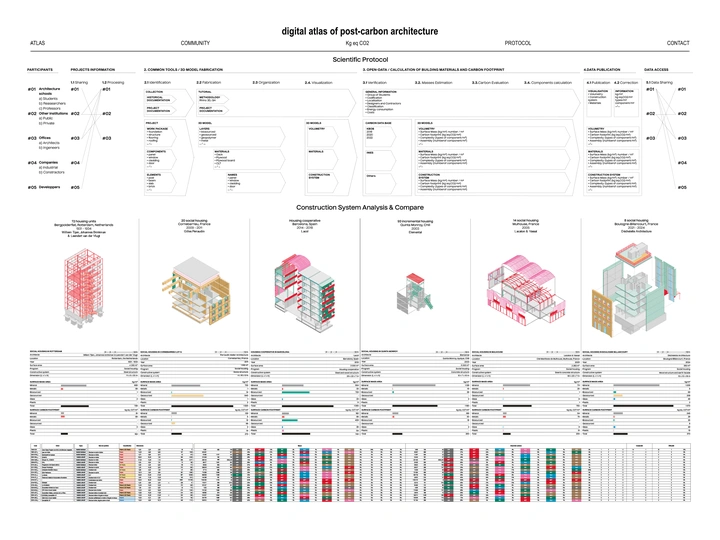Digital Atlas of post-carbon architecture

Margot Manasse
Philippe Rizzotti
Susanne Stacher
Lawan-Kila Toe
Paride Zambelli
Philippe Rizzotti is a French architect, associate professor at ENSAP Lille and researcher at the LéaV laboratory (ENSA Versailles). His academic and professional work focuses on sustainable construction, architectural reversibility, and low-carbon design strategies. Since 2010, his practice has developed public facilities and cultural infrastructures with a particular emphasis on material efficiency, adaptability, and integration within ecological transitions.
He is the initiator and scientific curator of The Digital Atlas of Post-Carbon Architecture, a transdisciplinary research project and forthcoming open-access platform. Developed by a team of architects, engineers, cartographers, and digital designers, the Atlas collects and analyzes contemporary architectural works that exemplify radical reductions in embodied carbon. Projects are selected for their technical, territorial, and pedagogical relevance, with the aim of building a collective knowledge base for decarbonizing the built environment.
The team’s interests lie in bridging research and practice through As-built case-based learning, comparative data, and visual tools for policy and design. The Atlas is grounded in the belief that architectural culture must evolve in response to planetary limits, and that sharing situated knowledge across contexts is essential to this transformation.
Notable achievements include the exhibition and publication Housing Footprint - Light and Low carbon construction (Pavillon de l’Arsenal, Paris, 2021), which received broad academic and professional recognition. The Atlas currently features over 76 documented case studies and is being integrated into teaching and public dissemination activities.
By joining the LINA platform, we aim to test our methodology, share and extend our database, and collaborate with a wider network of students, researchers and professionals to promote best practices in post-carbon architecture across Europe.
The Digital Atlas of Post-Carbon Architecture is a collaborative research project that aims to reduce the environmental impact of architecture by developing a common tool and open database to measure the carbon footprint of buildings and infrastructures. By combining 3D modeling, material analysis, and data visualization, the Atlas makes invisible data—like embodied carbon—visible, measurable, and comparable across diverse projects.
Using a simple color-coded system and interactive 3D models, the platform helps architects, engineers, students, and policymakers understand the weight, material composition, and carbon emissions of buildings. It allows users to explore case studies online, compare designs by various criteria (mass, emissions, complexity, efficiency, energy use, cost), and learn how architectural choices affect the environment.
The project grew from the 2021 exhibition and book "Housing Footprint - Lightweight and Low Carbon Construction" at the Pavillon de l’Arsenal, and now includes over 72 case studies from 1730 to today. Each building has been redrawn as a 3D “digital twin” and analyzed using a homogenized scientific method developped in collaboration with the Chair of Sustainable construction of the ETH-Zürich. These models are hosted on openarchitecture.org, a platform offering interactive tools and educational content. Presented at international events such as SBE Zurich, and supported by institutions including the French Ministry of Culture, Holcim France, Arcora, and Bollinger+Grohmann and PRA the Atlas supports both professional practice and academic research.
It is also part of an ongoing doctoral thesis led by architect and researcher Philippe Rizzotti at the LéaV Laboratory (ENSAV) in partnership with ETH Zurich. This project promotes a post-carbon architectural culture—where carbon footprint is not only a constraint but a creative driver—and aims to train a new generation of responsible architects equipped to address the climate crisis.